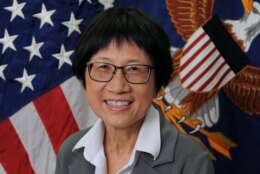Defense
-
For more, Bloomberg Government Deputy News Director Loren Duggan spoke to Federal Drive with Tom Temin.
November 01, 2021 -
Tim Jones, regional vice president of Systems Engineering, Public Sector, at ForeScout Technologies, joined host John Gilroy on Federal Tech Talk to discuss the world of Operational Technology.
November 01, 2021 -
The Biden administration is carrying the "Trusted Workforce 2.0" vetting reform effort forward.
November 01, 2021 -
The system allows ACC to continuously update software and provide patches.
October 29, 2021 -
DISA has a new set of strategic priorities, but may need to move some money around with flat defense budgets looming on the horizon.
October 29, 2021 -
In today's Federal Newscast, we get a look at just how many COVID-19 vaccine exemptions the military is allowing.
October 29, 2021 -
The chairman of the House readiness subcommittee wants detailed, near-term plans on what the military services are doing to address deteriorating facility conditions within the next three months.
October 29, 2021 -
It could take until 2030 for the Defense Department to implement all of the recommendations to improve sexual assault response.
October 28, 2021 -
When a part is needed for a plane in the Air Force, it usually comes through the 448th Supply Chain Wing in the Air Force Sustainment Center. Ensuring that all those parts get to their destinations, and that they are not tampered with or sabotaged, calls for a good deal of risk management.
October 27, 2021 -
While they are supposed to takeover some menial tasks and do some jobs better than actual employees, DoD personnel leadership doesn’t see it making an impact on how many civilian workers the Pentagon maintains. At least not yet.
October 26, 2021 -
America’s armed services will have to keep better track of their guns and explosives under changes. Congress is set to require. The Defense Department would have to tell both lawmakers and civilian law enforcement authorities more about guns that vanish from military armories, shipments and warehouses.
October 26, 2021 -
Jamal Byrd, a retired Air Force captain, explains why the Truth in Negotiations Act (TINA) needs to be updated or done away with.
October 25, 2021 -
New study, published this month in the journal Health Sciences Research, projected worse health outcomes for DoD beneficiaries even if as few as 10% of them were shifted to private-sector care.
October 25, 2021 -
Heidi Shyu, the new undersecretary of Defense for research and engineering, says one of her first tasks is to develop a clear picture of what DoD's innovation offices are working on, and share those technologies throughout the department.
October 25, 2021 -
The technology that controls nuclear weapons dates back to the 1950s. Imagine if the control systems were online in the age of ransomware. Dr. Herb Lin has thought about exactly that and written a book called Cyber Threats and Nuclear Weapons.
October 22, 2021
















